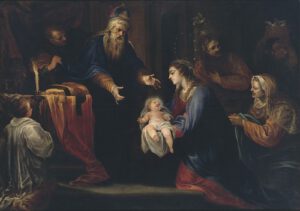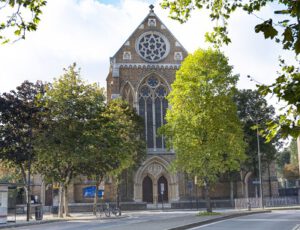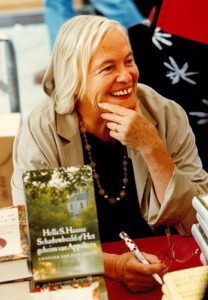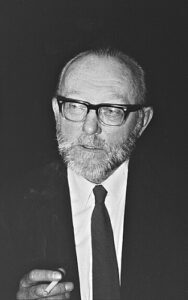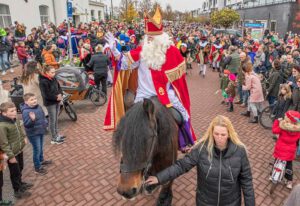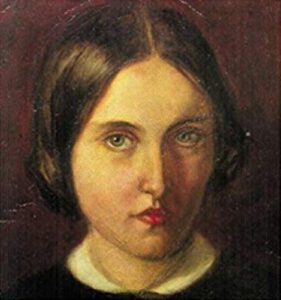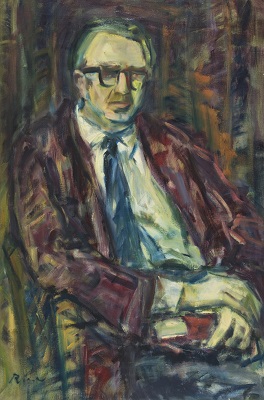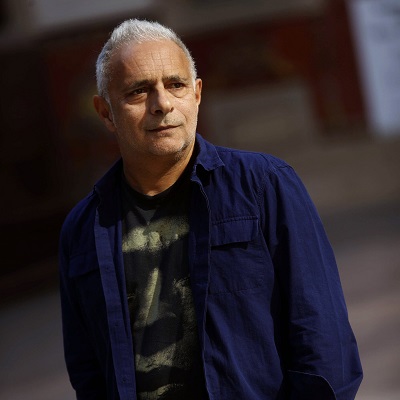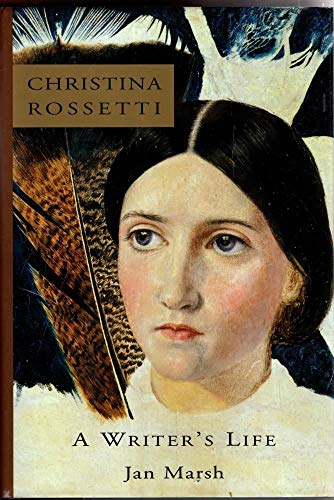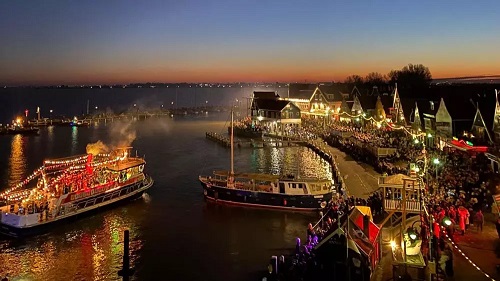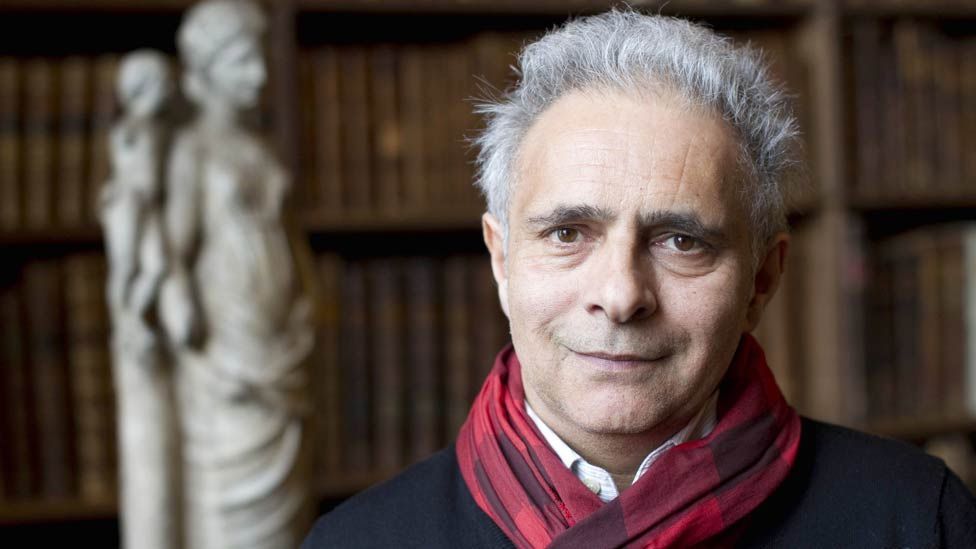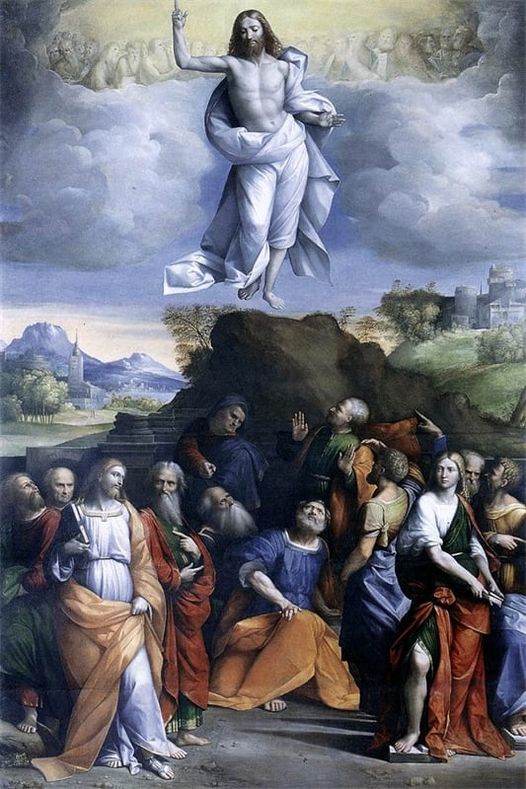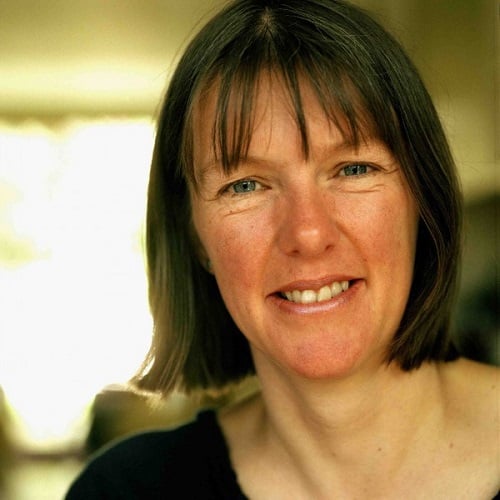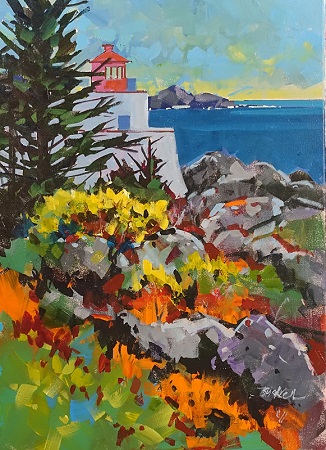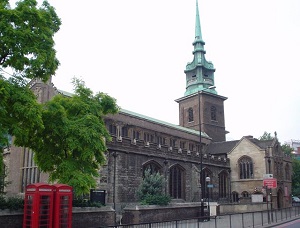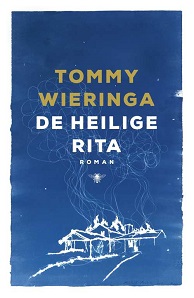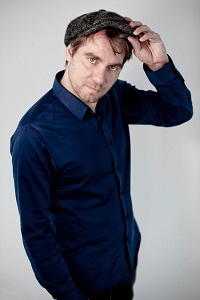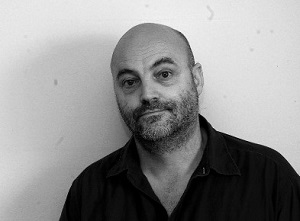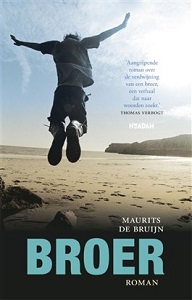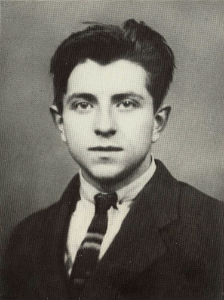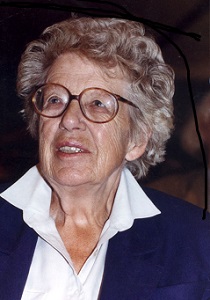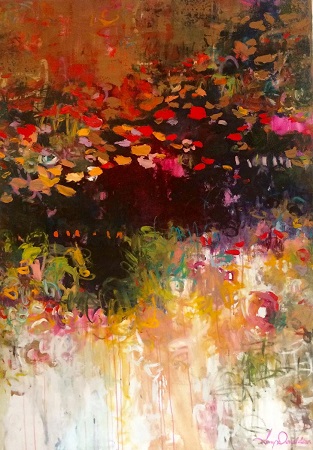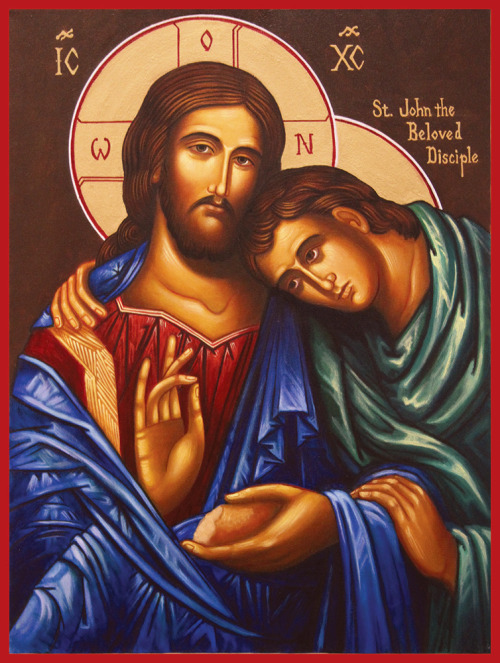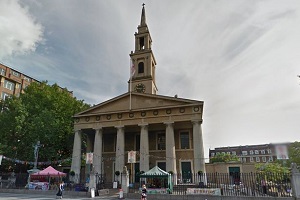De Britse schrijver en regisseur Hanif Kureishi werd geboren op 5 december 1954 in Bromley, Kent. Zie ook alle tags voor Hanif Kureishi op dit blog.
Uit: My Beautiful Laundrette
“INT. THE LAUNDRETTE. DAY OMAR is showing JOHNNY round the laundrette.
JOHNNY: I’m dead impressed by all this.
OMAR: You were the one at school. The one they liked.
JOHNNY: (Sarcastic) All the Pakis liked me.
OMAR: I’ve been through it. With my parents and that. And with people like you. But now there’s some things I want to do. Some pretty big things I’ve got in mind. I need to to make this place good. I want to raise money to make this place good. I want you to help me do that. And I want you to work here with me.
JOHNNY What kinda work is it?
OMAR: Variety. Variety of menial things.
JOHNNY: Cleaning windows kinda thing, yeah?
OMAR: Yeah. Sure. And clean out those bastards, will ya. (OMAR indicates the sitting KIDS playing about on the benches)
JOHNNY: Now?
OMAR: I’ll want everything done now. That’s the only attitude if you want to do any big. (JOHNNY goes to the KIDS and stands above them. Slowly he removes his watch and puts it in his pocket. This is a strangely threatening gesture. The KIDS rise and walk out one by one. ‘ One kid resents this. He pushes JOHNNY suddenly. JOHNNY kicks him hard.)
EXT. OUTSIDE THE LAUNDRETTE. DAY Continuous. The kicked KID shoots across the pavement and crashes into SALIM who is getting out of his car. SALIM pushes away the frantic arms and legs and goes quickly into the laundrette.
INT. LAUNDRETTE. DAY SALIM drags the reluctant OMAR by the arm into the back room of the laundrette. JOHNNY watches than, then follows.
INT. BACK ROOM OF LAUNDRETTE. DAY
SALIM lets go of OMAR and grabs a chair to stuff under the door handle as before. OMAR suddenly snatches the chair from him and puts it down slowly. And JOHNNY, taking OMAR’S lead, sticks his big boot in the door as SALIM attempts to slant it.
SALIM: Christ, Omar, sorry what happened before. Too much to drink. Just go on one little errand for me, eh? (He opens OMAR ’s fingers and presses a piece of paper into his hand.) Like before. For me. OMAR: For fifty quid as well. snum: You little bastard. (OMAR turns away. JOHNNY turns away too, mocking SALIM, parodying OMAR.) All right.”
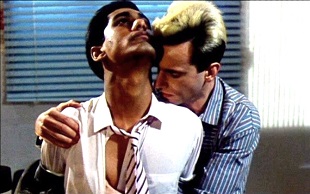
Hanif Kureishi (Bromley, 5 december 1954)
Omar (Gordon Warnecke) en Johnny (Daniel Day-Lewis) in de film uit 1985
De Oostenrijkse schrijver en taalkundige Alois Brandstetter werd op 5 december 1938 in Aichmühl bei Pichl, Oberösterreich geboren. Zie ook alle tags voor Alois Brandstetter op dit blog.
Uit: Kummer ade!
„In der Don-Bosco-Kirche am Bischof-Josef-Köstner-Platz in Klagenfurt hat neulich jemand den sogenannten Kummerkasten samt Inhalt »mitgehen lassen«. Das hat der Kirchenrektor Pater M. am vergangenen Sonntag nach der Messe im Rahmen der Verlautbarungen vor dem Schluß-segen uns, seiner Gemeinde, zur Kenntnis gebracht. Ob-wohl auf dem Kummerkasten im Vorraum zur eigent-lichen Kirche in einer Art Eingangshalle, die man bei mittelalterlichen Kirchen das »Paradies«, auch »Narthex« oder »Galiläa« genannt hat, deutlich lesbar stand: »Bitte kein Geld einwerfen!« und: »Ihre Meinung bitte! Anre-gungen, Wünsche und Beschwerden«, hat der Dieb, ver-mutlich ein Analphabet, den sogenannten Kummerkasten mit dem Opferstock verwechselt – und gestohlen – nach der »Beseitigung eines, die Wertsache vor Wegnahme schützenden Hindernisses«, wie die Juristen sagen. Eine illegitime »Besitzergreifung« also! Rauben im juristischen Sinne mußte er die Kiste ja nicht, weil sie unbewacht war und er keinen Wächter oder Custos überwältigen mußte, auch keinen Engel mit einem flammenden Schwert, wie er vor dem Paradies steht … Und einbrechen mußte er in das »Paradies« auch nicht, weil die Don-Bosco-Kirche eines jener katholischen Gotteshäuser ist, die Tag und Nacht frei zugänglich sind, um Besuchern rund um die Uhr zur Besichtigung, vor allem aber für Gebet oder Meditation zur Verfügung zu stehen. Noch fehlt in den meisten Got-teshäusern die Videoüberwachung, weil man vielleicht davon ausgeht: Gott sieht eh alles … Vielleicht hat der Täter oder die Täterin auch Frömmigkeit geheuchelt und vor der Tat ein Gebet gesprochen, um in Wahrheit aber nur zu warten, bis die Gelegenheit günstig, die Luft rein ist und der letzte Besucher die Kirche verlassen hat, um dann zuzuschlagen. Auch Helfer und Hehler sind denkbar, die Schmiere gestanden haben mögen … Nein, zuschlagen mußte der Täter oder die Täterin ja gar nicht, weil die Beschwerdebox nicht besonders verankert – und so eine leichte Beute war.“
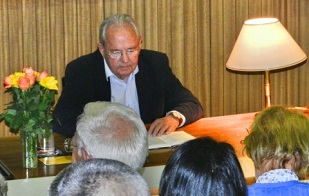
Alois Brandstetter (Aichmühl, 5 december 1938)
De Amerikaanse schrijfster Joan Didion werd geboren in Sacramento Valley op 5 december 1934. Zie ook alle tags voor Joan Didion op dit blog.
Uit: Play It as It Lays
“(I talk about Kate to no one here. In the place where Kate is they put electrodes on her head and needles in her spine and try to figure what went wrong. It is one more version of why does a coral snake have two glands of neurotoxic poison.
Kate has soft down on her spine and an aberrant chemical in her brain. Kate is Kate. Carter could not remember the soft down on her spine or he would not let them put needles there.) From my mother I inherited my looks and a tendency to migraine. From my father I inherited an optimism which did not leave me until recently.
Details: I was born in Reno, Nev., and moved nine years later to Silver Wells, Nev., pop. then 28, now 0. We moved down to Silver Wells because my father lost the Reno house in a private game and happened to remember that he owned this town, Silver Wells. He had bought it or won it or maybe his father left it to him, I’m not sure which and it doesn’t matter to you. We had a lot of things and places that came and went, a cattle ranch with no cattle and a ski resort picked up on somebody’s second mortgage and a motel that would have been advantageously situated at a freeway exit had the freeway been built; I was raised to believe that what came in on the next roll would always be better than what went out on the last. I no longer believe that, but I am telling you how it was. What we had in Silver Wells was three hundred acres of mesquite and some houses and a Flying A and a zinc mine and a Tonopah & Tidewater RR siding and a trinket shop and later, after my father and his partner Benny Austin hit on the idea that Silver Wells was a natural tourist attraction, a midget golf course and a reptile museum and a restaurant with some slots and two crap tables. The slots were not exactly moneymakers because the only person who played them was Paulette, with nickels from the cashbox. Paulette ran the restaurant and (I see now) balled my father and sometimes let me pretend to cashier after school. I say “pretend” because there were no customers. As it happened the highway my father counted on came nowhere near and the money ran out and my mother got sick and Benny Austin went back to Vegas, I ran into him in the Flamingo a few years ago. “Your father’s only Waterloo was he was a man always twenty years before his time,” Benny advised me that night in the Flamingo. ‘The ghost-town scheme, the midget golf, the automatic blackjack concept, what do you see today? Harry Wyeth could be a Rockefeller in Silver Wells today.”
“There isn’t any Silver Wells today,” I said. “It’s in the middle of a missile range.”
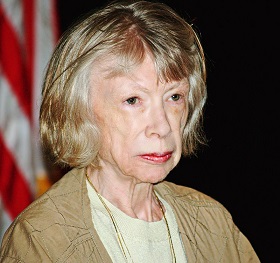
Joan Didion (Sacramento Valley, 5 december 1934)
De Engelse dichteres en schrijfster Christina Georgina Rossetti werd geboren in Londen op 5 december 1830. Zie ook alle tags voor Christina Rossetti op dit blog.
If The Moon Came From Heaven
If the moon came from heaven,
Talking all the way,
What could she have to tell us,
And what could she say?
‘I’ve seen a hundred pretty things,
And seen a hundred gay;
But only think: I peep by night
And do not peep by day!’
If The Sun Could Tell Us Half
If the sun could tell us half
That he hears and sees,
Sometimes he would make us laugh,
Sometimes make us cry:
Think of all the birds that make
Homes among the trees;
Think of cruel boys who take
Birds that cannot fly.
Een verjaardag
Mijn hart is zoals een zingende vogel
wiens hart overloopt van vreugde:
Mijn hart is zoals een appelboom
wiens takken buigen door het rijpe fruit;
Mijn hart is zoals een regenboogschelp
die dobbert op een vredige zee;
Mijn hart is zo gelukkig en fier,
want mijn lief kwam, mijn lief is hier.
Richt zijden baldakijnen op voor mij;
Versier ze met bont en purperkleuren;
Graveer granaatappels en duiven
en pauwen met honderden ogen;
Borduur ze met filigranen druiven
en met blaren en fleurs-de-lys;
Daar ik de jaardag van mijn leven vier,
want mijn lief kwam, mijn lief is hier.
Vertaald door Lepus
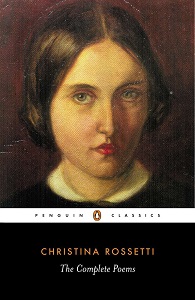
Christina Rossetti (5 december 1830 – 27 december 1894)
Cover
De Russische dichter Fjodor Tjoettsjev werd geboren op 5 december 1803 in Ovstug in het gouvernement Orjol. Zie ook alle tags voor Fjodor Tjoettsjev op dit blog.
Silentium
Geen woord, kruip weg en ongestoord
Blijft wat jij voelt, wat jou bekoort –
En stil als sterren in de nacht
Komen, en gaan steeds even zacht,
Heel diep in jou je dromen voort,
Bewonder ze – en zeg geen woord.
Hoe kan het hart zich doen verstaan?
Is iemand met jouw lot begaan?
Kan jij bij iemand ooit terecht?
Verwoord is elke droom onecht;
Door roering wordt de bron verstoord,
Laaf je eraan – en zeg geen woord.
Volg slechts je eigen levenszin –
Er schuilt een wereld binnenin
Vol dromen, geheimzinnigheid
Die door het daglicht wordt ontwijd
En in het straatrumoer gesmoord,
Hoor naar die zang – en zeg geen woord!
Vertaald door Margriet Berg en Marja Wiebes
Ik houd van het geloof der lutheranen
Ik houd van het geloof der lutheranen,
Hun dienst: eenvoud en waardigheid alom,
De kale muren van hun heiligdom,
Die ons met strenge soberheid vermanen.
Ziet gij het niet? Klaar om terug te treden
Toont het geloof zich voor de laatste maal:
Nog heeft het niet de drempel overschreden,
Maar nu al is het godshuis leeg en kaal,
Nog heeft het niet de drempel overschreden,
Nog viel de zware deur niet in het slot…
Maar ’t uur is aangebroken. Richt uw beden
Nu voor de allerlaatste maal tot God.
1834
Vertaald door Werkgroep Slavistiek Leiden
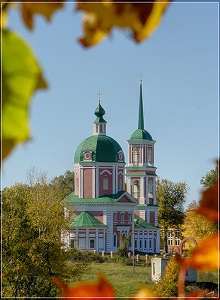
Fjodor Tjoettsjev (5 december 1803 – 27 juli 1873)
Kerk in Ovstug, Orjol
De Amerikaanse schrijver, journalist en columnist Calvin (Bud) Marshall Trillin werd geboren op 5 december 1935 in Kansas City, Missouri. Zie ook alle tags voor Calvin Trillin op dit blog.
Uit: Feeding a Yen
“When I was a child, bagel consumption in Kansas City was not widespread. Bagels were thought of as strictly Jewish food, eaten mainly in New York. In those days, of course, salsa would have been considered strictly Mexican food, if anybody I knew in Kansas City had ever given any consideration to salsa. I doubt if many gentiles in Kansas City had ever heard of a bagel, let alone eaten one. Bagels were available in only two or three stores, one of which was called the New York Bakery. It was only in the real New York that bagels were part of the culture, for both Jews and gentiles. New Yorkers have always talked about picking up freshly baked bagels late at night and being reassured, as they felt the warmth coming through the brown paper bag, that they would be at peace with the world the next morning, at least through breakfast. They’ve talked about that day in the park when nothing seemed to soothe their crying baby until a grandmotherly woman sitting on a nearby bench, nattering with another senior citizen about Social Security payments or angel food cake recipes or Trotskyism, said that the only thing for a teething infant was a day-old bagel. They’ve talked about the joy of returning to New York from a long sojourn in a place that was completely without bagels–Indonesia or a tiny town in Montana or some other outpost in the vast patches of the world that New Yorkers tend to think of as the Bagel Barrens.
Roughly corresponding to the time it took our girls to grow up and move to California, bagels had become assimilated. Gefilte fish was still Jewish food, but not bagels. The bagel had gone from a regional ethnic food to an American standard, served at McDonald’s and available on supermarket shelves all over the part of America that baked-goods sociologists have long identified with white bread. At one point, I read that, because of a new plant established by one of the firms producing supermarket bagels, the state that led all other American states in turning out bagels was Iowa. A couple of years before Abigail and I discussed pumpernickel bagels on the way back from Chinatown, The New York Times had run a piece by Suzanne Hamlin reporting that in places recently introduced to bagels, emergency rooms were seeing an increasing number of bagel-related injuries–cuts, gouges, and severed digits caused by “impatient eaters who try to pry apart frozen bagels with screwdrivers, attempt to cut hard bagels with dull knives and, more than likely, use their palms as cutting boards.” There had been no increase in New York bagel injuries.”
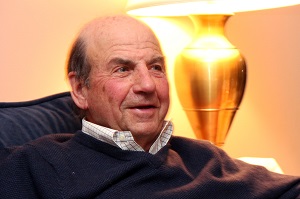
Calvin Trillin (Kansas City, 5 december 1935)
De Russische dichter Afanasy Afanasievich Fet werd geboren op 5 december 1820 nabij Mzensk. Zie ook alle tags voor Afanasy Fet op dit blog.
Butterfly
Yes, right you are! Alone for outlines airy
I am so fine.
All velvet mine with all its twinkle merry—
Two wings of mine.
O, never ask me, wherefrom I appear
Or whither flit!
Upon a flow’r I have alighted here
To breathe and sit.
How long, without an effort, aim or worry
Am I to stay?
Just see, now I will flash my spread wings glory
And fly away.
Vertaald door U.R. Bowie
By life tormented, and by cunning hope (Fragment)
By life tormented, and by cunning hope,
When my soul surrenders in its battle with them,
Day and night I press my eyelids closed
And sometimes I’m vouchsafed peculiar visions.
The gloom of quotidian existence deepens,
As after a bright flash of autumn lightning,
And only in the sky, like a call from the heart,
The stars’ golden eyelashes sparkle.
And the flames of infinity are so transparent,
And the entire abyss of ether is so close,
That I gaze direct from time into eternity
And recognize your flame, universal sun.
Motionless, encircled by fiery roses,
The living altar of the cosmos smolders
And in its smoke, as in creative slumber,
All forces quiver, eternity’s a dream.
And all that rushes through the abyss of ether,
And every ray, embodied or ethereal,-
Is but your reflection, O universal sun,
It is but a dream, but a fleeting dream.
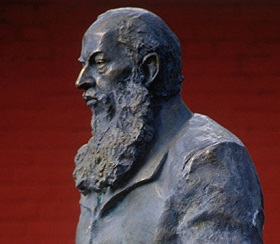
Afanasy Fet (5 december 1820 – 3 december 1892)
Borstbeeld in Mzensk
De Duitse schrijver Hans Hellmut Kirst werd geboren op 5 december 1914 te Osterode (voorm. Ost Preussen, nu Polen). Zie ook alle tags voor Hans Hellmut Kirst op dit blog.
Uit: 08/15
„Schulz drehte sich langsam um und schaukelte sich verheißungsvoll auf ihn zu. »Vierbein«, sagte er, und er hatte seine kräftige Stimme mit Wohlwollen eingefettet, »wollen Sie mir einen Gefallen tun?«
Vierbein glaubte zu erblassen. »Jawohl, Herr Hauptwachtmeister!« rief er mutig.
»Sie brauchen nicht, wenn Sie nicht wollen. Das ist kein Befehl, Vierbein. Ich kann das nicht befehlen. Wenn Sie keine Lust haben, sagen Sie es mir ruhig. Dann gehen Sie eben Latrinen reinigen. Wollen Sie?«
»Jawohl, Herr Hauptwachtmeister.«
»Was? Latrinen reinigen?«
»Was Herr Hauptwachtmeister befehlen!«
»Na schön«, sagte der Spieß zufrieden. »Ich habe es auch nicht anders erwartet. Melden Sie sich bei meiner Frau zum Teppichklopfen.«
Der Hauptwachtmeister Schulz wanderte durch die Korridore des Batterieblocks; und wo er hinkam, nahm der Arbeitseifer sichtlich zu. Das bereitete ihm gelinde Genugtuung, obwohl er im Grunde seiner Kasernenhofseele eine derartige Reaktion als selbstverständlich empfand. Ungewöhnlich nur, wenn sie ausbliebe.
Für Dreck in jeder Form hatte er einen sechsten Sinn. Er sah auf zehn Meter Entfernung, ob die Rillen der Fliesen schmutzfrei waren. Waren sie es nicht, pflegte er mit dem Daumennagel prüfend in sie hineinzufahren und das so zusammengescharrte Häuflein Dreck dem nachlässigen Soldaten unter die Nase zu reiben, was dann natürlich auch eine Notiz in seinem Merkbuch, dem »Kohlenkasten«, zur Folge hatte.
So also schritt er, mit gelindem Genuß Unruhe verbreitend, durch sein Batterierevier. Aber tiefe Freude empfand er diesmal dabei nicht, obwohl es ihm doch nahezu spielend gelungen war, bereits in kurzer Zeit ein volles dutzendmal sogenannte »grobe Nachlässigkeit« festzustellen. Damit sollte es, für diesen Tag, genug sein. Klug, wie er war, hatte er in nur sieben Dienstjahren erkannt, daß ein Übermaß an Strafe, und somit eine zu hohe Zahl an Bestraften, lediglich abstumpft. Die feine Dosierung war das Geheimnis des Erfolges!
Er blieb in der Nähe des Schwarzen Brettes stehen, bewunderte kurz seine schwungvolle Unterschrift, die einen dort aushängenden Batteriebefehl zierte – gezeichnet: Derna, Hauptmann und Batteriechef; für die Richtigkeit: Schulz (sehr kühn, sehr energisch, kurvenreich und doch markig), Hauptwachtmeister.”
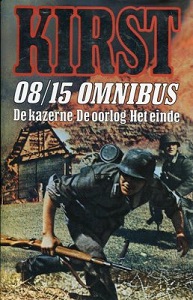
Hans Hellmut Kirst (5 december 1914 – 23 februari 1989)
Cover
De Duitse dichteres en schrijfster Eugenie Marlitt werd geboren op 5 december 1825 in Arnstadt. Zie ook alle tags voor Eugenie Marlitt op dit blog.
Uit: Die zwölf Apostel
„Es würde wohl nie ein fremder Fuß diesen entlegenen, sehr wenig einladenden Stadtteil betreten haben, wenn nicht das alte Kloster ein Juwel neben sich gehabt hätte, ein köstliches Denkmal längst versunkener Zeiten, die Liebfrauenkirche, um deren zwei schlanke Türme eine ganze reiche Sagenwelt webte und blühte. Die Kirche stand unbenutzt und verschlossen und nie mehr seit dem letzten Miserere der Nonnen hatten heilige Klänge durch die mächtigen Säulengänge gerauscht. Die ewige Lampe war verlöscht; die Orgel lag zertrümmert am Boden; um den verlassenen Hochaltar flatterten Schwalben und Fledermäuse, und die prächtigen, anspruchsvollen Grabmonumente alter untergegangener Geschlechter ruhten unter dichten Staubschichten. Nur die Glocken, deren wundervolles harmonisches Zusammenklingen in der ganzen Gegend berühmt war, schwangen sich noch allsonntäglich über den verwaisten Hallen, aber ihr wehmütiger Klang vermochte nicht die Gläubigen dahin zurückzuführen.
Daß man neben diesem Prachtbau mit seinen granitnen Mauern und Säulen das hinfällige Kloster stehen ließ, hatte seinen Grund in der weisen Oekonomie der löblichen Stadtbehörde. Es hatte längst seine eigentliche Bestimmung verloren. Luthers gewaltiges Wort hatte auch hier die Riegel gesprengt. Die zur neuen Lehre bekehrte Stadt duldete die gottgeweihten Jungfrauen, bis die letzte derselben eines seligen Todes verblichen war; dann aber fiel das Klostergebäude der Stadtverwaltung anheim, die es einem Teil der Armen als Asyl einräumte. Seit der Zeit sah man hinter den vergitterten Fenstern statt der bleichen Nonnengesichter bärtige Züge, oder den Kopf einer emsig flickenden und keifenden Hausmutter, während auf den ausgewaschenen Steinplatten des Hofes, welche früher nur die leise Sohle und die klösterliche Schleppe der frommen Schwestern berührt hatten, eine Schar wilder zerlumpter Kinder sich tummelte. Außer dem blühenden Gärtchen auf der Mauer aber hatte das alte Haus noch eine freundliche Seite, auf welcher der Blick ausruhen konnte, wenn er all das hier zusammengedrängte menschliche Elend gesehen hatte. Die Ecke, an welche die Stadtmauer stieß, zeigte vier sauber gewaschene Fenster mit weißen Vorhängen, von denen das letzte so auf das Gärtchen mündete, daß es bequem als Thür benutzt werden konnte, was jedenfalls auch geschah, denn an gewissen Tagen in der Woche war es weit geöffnet.”
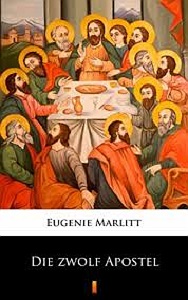
Eugenie Marlitt (5 december 1825 – 22 juni 1887)
Cover
Zie voor nog meer schrijvers van de 5e december ook mijn blog van 5 december 2011.
